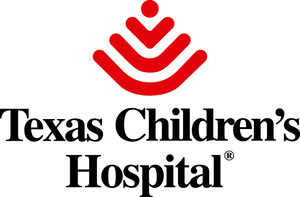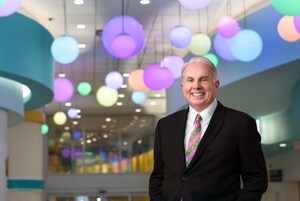The Jan and Dan Duncan Neurological Research Institute at Texas Children's Hospital hosts international symposium on cognitive disorders
HOUSTON, June 7, 2012 /PRNewswire-USNewswire/ -- The Jan and Dan Duncan Neurological Research Institute at Texas Children's Hospital (NRI), one of the world's first basic research institutes dedicated to childhood neurological diseases, recently joined with Genentech, Inc. and the journal Science Translational Medicine, to stage an international symposium on disorders of synaptic dysfunction – a growing class of neurological disorders including autism. Leaders from around the world in academia, industry, and federal and non-federal funding organizations participated in the two-day event to improve understanding of these disorders and develop strategies to enhance the likelihood of developing successful therapies for individuals who live with such disorders. Watch a video about the symposium.
Dr. Huda Y. Zoghbi, director of the NRI at Texas Children's Hospital, professor of neurology, neuroscience, pediatrics, and molecular and human genetics at Baylor College of Medicine (BCM), and investigator, Howard Hughes Medical Institute, co-organized the symposium with Morgan Sheng, M.B.B.S., Ph.D., Vice President of Neuroscience, Genentech, Inc.
Zoghbi said the symposium was successful in identifying the vast knowledge gaps that exist in research related to autism spectrum disorders and Rett, Angelman and Fragile X syndromes, among others.
"Our first biennial symposium featured 23 leading physicians and scientists from around the world to identify the key issues that must be addressed to move forward from recent genetic discoveries to effective therapies for autism and cognitive disorders," said Zoghbi. "More than 300 physicians, scientists and students attended the event. One of our goals was to define pathways that are potential targets for therapeutic interventions in this genetically diverse group of diseases." The attendance of individuals affected by these disorders during the luncheon and the participation in symposium sessions and workshops by several parents of affected individuals was extremely valuable and appreciated by the scientists, Zoghbi added
A unique and refreshing feature of the symposium was engaging young scientists, many still in training, in the workshops and in setting the priorities for research over the next five years, said Rodney Samaco, assistant professor of molecular and human genetics at BCM. Samaco and Mingshan Xue, a postdoctoral fellow at the University of California, San Diego, co-led the workshop discussion among young investigators.
"These young scientists provided brilliant ideas and were inspired to go into this field as they establish their own laboratories," Samaco said. "Creating a venue in which early-stage investigators could discuss these challenging disorders and critically assess the need for progress was a truly remarkable and stimulating component of the symposium."
The symposium and workshops covered a range of research on neurological disorders, including: neural connectivity; dysfunction of proteins at synapses, which may interfere with the passing of electrical or chemical signals within the nervous system; signaling networks that regulate synaptic development and cognitive function; research updates on Angelman syndrome, autism, Rett syndrome and tuberous sclerosis complex or TSC; and the identification of new research paths and priorities for advancing promising discoveries with translational potential.
To share the information with the broader scientific community, a white paper detailing the symposium findings will be published by Science Translational Medicine.
Symposium attendees discussed the need to publish all well-designed research studies, including those with negative outcomes, for their contribution of relevant information that can save time in future research. They agreed that ongoing research into disorders of synaptic dysfunction requires a multidisciplinary team effort to evaluate ideas and to define paths for progress. Because autism likely represents multiple discrete disorders ("autisms"), improved diagnosis and treatment will require the identification of the causes and genetic underpinnings of each.
"We understand there is an urgent sense from the community to get answers," Thomas Insel, M.D., director of the National Institute of Mental Health (NIMH), told the audience. "Unfortunately, there are still huge gaps in knowledge and the research community is working toward closing those gaps. It is difficult to formulate clinical trials for diseases when we don't actually know enough about the targets. There is still so much we do not understand and the research community must continue to share all information so progress can move forward."
One way researchers can share information is through the NeuroNEXT program, developed by the National Institute of Neurological Disorders and Stroke (NINDS). Story Landis, Ph.D., director of NINDS, said this network of neuroscience clinical trials provides a robust, standardized and accessible infrastructure for rapid development and implementation of protocols in neurological disorders affecting both adults and children.
"I was inspired by the enthusiasm and response of the researchers and students in attendance," said Zoghbi. "The group identified new paths for research and discussed how we can do a better job of sharing results, both positive and negative outcomes, as we move forward to advance discoveries."
For more information about the Jan and Dan Duncan Neurological Research Institute at Texas Children's Hospital, visit www.nri.texaschildrens.org.
About Texas Children's Hospital
Texas Children's Hospital, a not-for-profit organization, is committed to creating a community of healthy children through excellence in patient care, education and research. Consistently ranked among the top children's hospitals in the nation, Texas Children's has recognized Centers of Excellence in multiple pediatric subspecialties including the Cancer and Heart Centers, and operates the largest primary pediatric care network in the country. Texas Children's has completed a $1.5 billion expansion, which includes the Jan and Dan Duncan Neurological Research Institute; Texas Children's Pavilion for Women, a comprehensive obstetrics/gynecology facility focusing on high-risk births; and Texas Children's Hospital West Campus, a community hospital in suburban West Houston. For more information on Texas Children's, go to www.texaschildrens.org. Get the latest news from Texas Children's by visiting the online newsroom and on Twitter at twitter.com/texaschildrens.
About Baylor College of Medicine
Baylor College of Medicine (www.bcm.edu) in Houston is recognized as a premier academic health science center and is known for excellence in education, research and patient care. It is the only private medical school in the greater southwest and is ranked as one of the top 25 medical schools for research in U.S. News & World Report. BCM is listed 13th among all U.S. medical schools for National Institutes of Health funding, and No. 2 in the nation in federal funding for research and development in the biological sciences at universities and colleges by the National Science Foundation. Located in the Texas Medical Center, BCM has affiliations with eight teaching hospitals. Currently, BCM trains more than 3,000 medical, graduate, nurse anesthesia, and physician assistant students, as well as residents and post-doctoral fellows. BCM is also home to the Baylor Clinic, an adult clinical practice that includes advanced technologies for faster, more accurate diagnosis and treatment, access to the latest clinical trials and discoveries, and groundbreaking healthcare based on proven research. Follow Baylor College of Medicine on facebook (http://www.facebook.com/BaylorCollegeOfMedicine) and twitter (http://twitter.com/BCMHouston).
| Contacts: |
Cherri Carbonara |
Christy Brunton |
| O: (713) 524-8170 |
O: (832) 824-2645 |
|
| C: (832) 473-6380 |
C: (281) 684-3184 |
|
SOURCE Texas Children's Hospital
WANT YOUR COMPANY'S NEWS FEATURED ON PRNEWSWIRE.COM?
Newsrooms &
Influencers
Digital Media
Outlets
Journalists
Opted In





Share this article